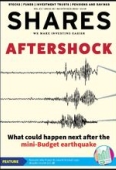Archived article
Please note that tax, investment, pension and ISA rules can change and the information and any views contained in this article may now be inaccurate.
SAINTS: the Baillie Gifford trust which has performed best in 2022
The Scottish American Investment Trust (SAIN) or ‘SAINTS’, has been managed by Baillie Gifford since 2004 and is focused on delivering real dividend growth by increasing capital and growing income.
Notably over the last 12 months it has performed better than other trusts in the asset manager’s stable, including higher profile names like Scottish Mortgage (SMT). In absolute terms though, it has still lost investors money (-7%) and it compares less favourably on a longer-term view, though its aims are different than a more pure growth-focused fund like Scottish Mortgage and perhaps better suited to the current market environment.
The trust was founded in 1873 to seek higher income outside the UK and has grown its dividend for 48 consecutive years. The last time the dividend was cut was 1938, before the Second World War.
Since 2014 the trust has grown its dividend by 2.9% ahead of UK consumer price inflation, more than maintaining investors’ purchasing power. The current dividend yield is 2.9%.
The trust aims to be a core holding for investors looking for income and has an objective to grow the dividend at a faster rate than inflation over rolling five-year holding periods which it has comfortably achieved.
Total growth in net asset value over the last decade has been 246%, exceeding the benchmark return (FTSE-World Index) of 232%. The trust trades at 12.2% discount to net asset value, the deepest discount since Baillie Gifford started managing the fund nearly two decades ago.
Led by co-heads James Dow and Toby Ross, who have a combined 34 years of investment experience, they are supported by portfolio manager Ross Mathison and the depth of Baillie Gifford’s research resources.
FOCUS ON STEADY GROWERS
Dow told Shares that the team are focused on finding and investing in steady, long-term compounders which throw-off sustainable,
resilient dividends.
The team believe that dividend growth is closely associated with compounding and enhances returns.
Dow said the approach is similar in style to investment guru Warren Buffett, and Fundsmith founder Terry Smith. SAINTS likens compounding to the effect of a snowball rolling down a long hill. The further it travels, the faster it gains in size.
The team operate a global mandate which gives them a larger universe than a purely domestically-focused one with more than 5,000 companies to consider.
BOTTOM-UP ANALYSIS
They conduct bottom-up company analysis where the primary objective is to discover the size of the growth opportunity and test the resilience of the dividend by looking at previous downturns.
A ‘deep dive’ is conducted to assess the reputation of the company, its competitiveness and industry trends. The portfolio consists of 60 names roughly equally weighted and the managers often start with a 1% position and look to add over time.
The average size of holdings across the portfolio is under 2%. Positions are trimmed if they reach 5% of the portfolio. Companies are held for the long term to benefit from compounding and the average holding period is around seven years.
RISK MANAGEMENT
Companies in the portfolio are consistently reviewed to ensure they are delivering expected earnings and dividend growth. Those failing to achieve expectations are sold. An example is personal care and hygiene products company Kimberly Clarke de Mexico which was sold in early 2022. The company had failed to deliver expected growth. It turned out to be more sensitive to the Mexican economy than the team anticipated.
In its place SAINTS purchased US small business services provider Intuit (INTU:NASDAQ). Dow believes the company can grow its earnings by around 15% a year as it adds new customers and increases customer spending.
PRUDENT GEARING TO ENHANCE YIELD
The trust uses its ability to borrow money to invest in higher yielding investments such as property and infrastructure which represent around 15% of assets. SAINTS recently refinanced its long-term borrowing facility which reduced the cost of funding from 8% to 3%. The facility runs until 2048.
The trust has an annual ongoing charge of 0.62% a year. Investors interested in buying the trust also need to factor in dealing charges and platform fees if applicable.
Important information:
These articles are provided by Shares magazine which is published by AJ Bell Media, a part of AJ Bell. Shares is not written by AJ Bell.
Shares is provided for your general information and use and is not a personal recommendation to invest. It is not intended to be relied upon by you in making or not making any investment decisions. The investments referred to in these articles will not be suitable for all investors. If in doubt please seek appropriate independent financial advice.
Investors acting on the information in these articles do so at their own risk and AJ Bell Media and its staff do not accept liability for losses suffered by investors as a result of their investment decisions.
Issue contents
Feature
Great Ideas
- Ruffer delivers positive return in difficult times but sees more pain for investors
- Ideal time to invest in life sciences cheaply through this trust
- Essentra's transformation to a pure-play industrial supplier is now complete
- How Crestchic is powering up for a growth push and why now is a great time to buy
Investment Trusts
News
- Will Porsche shares surge like Ferrari or skid like Aston Martin?
- Resilient Greggs holds firm on outlook in good start for Roisin Currie
- FTSE 100 firms set for record cash return in 2022 but pressures are mounting
- Find out which stocks surged and slumped during a turbulent third quarter
- Why dollar strength and foreign exchange volatility is bad for stock markets

 magazine
magazine








